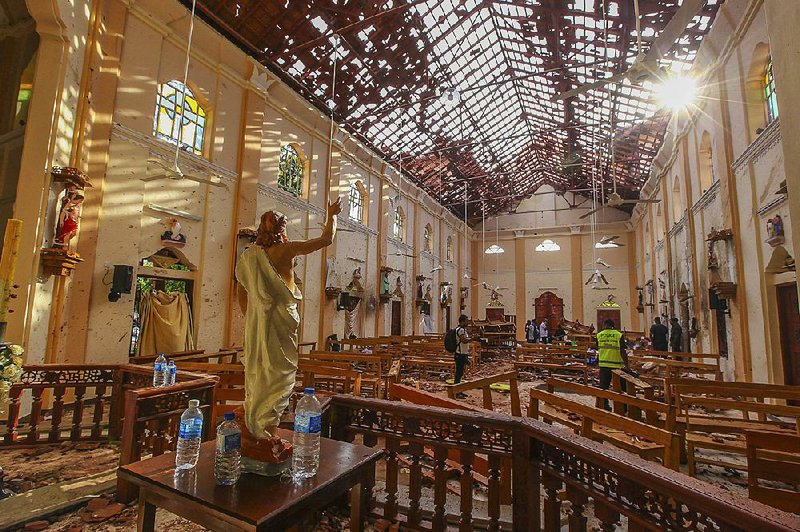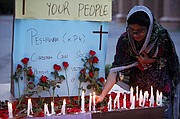COLOMBO, Sri Lanka -- More than 200 people were killed and hundreds more wounded in nine bombings that rocked churches, luxury hotels and other sites in Sri Lanka on Easter Sunday -- the deadliest violence the South Asian island country has seen since a bloody civil war ended a decade ago.
Defense Minister Ruwan Wijewardena described the blasts as a terrorist attack by religious extremists, and police said 13 suspects were arrested, though there was no immediate claim of responsibility. Wijewardena said most of the bombings were believed to have been suicide attacks.
Police said today that an investigation will examine reports that the intelligence community failed to detect or warn of possible suicide attacks.
The explosions -- most of them in or around Colombo, the capital -- collapsed ceilings and blew out windows, killing worshippers and hotel guests in one scene after another of smoke, soot, blood, broken glass, screams and wailing alarms. Victims were carried out of blood-spattered pews.
"People were being dragged out," said Bhanuka Harischandra of Colombo, a 24-year-old founder of a tech marketing company who was going to the city's Shangri-La Hotel for a meeting when it was bombed. "People didn't know what was going on. It was panic mode."
He added: "There was blood everywhere."
Police spokesman Ruwan Gunasekara said at least 290 people were killed and more than 500 wounded. He said police found a safe house and a van used by the attackers.
Most of those killed were Sri Lankans. But the three bombed hotels and one of the churches, St. Anthony's Shrine, are frequented by foreign tourists, and Sri Lanka's Foreign Ministry said the bodies of at least 35 foreigners from several countries were recovered.
The dead included "several" Americans, Secretary of State Mike Pompeo said. He blamed "radical terrorists."
Britain, China, Portugal, India, Japan and Turkey said they, too, lost citizens.
The Sri Lankan government imposed a nationwide curfew from 6 p.m. to 6 a.m. and blocked Facebook and other social media, saying it needed to curtail the spread of false information and ease tension in the country of about 21 million people.
The shock of the bombings and the anger they generated was compounded by news that a top police official had alerted security officials 10 days earlier about a threat to churches from a radical Islamist group, National Thowheeth Jama'ath. It was unclear what precautions, if any, had been taken, or whether that group had played any role in the assaults.
Prime Minister Ranil Wickremesinghe said the suspects were "local." He told reporters that elements of the government had prior intelligence about the attacks.
"Information was there," he said at a news conference. "That is a matter that we need to look into."
Two government ministers have alluded to intelligence failures. Telecommunications Minister Harin Fernando tweeted, "Some intelligence officers were aware of this incidence. Therefore there was a delay in action. Serious action needs to be taken as to why this warning was ignored." He said his father had heard of the possibility of an attack as well and had warned him not to enter popular churches.
And Mano Ganeshan, the minister for national integration, said the security officers within his ministry had been warned by their division about the possibility two suicide bombers would target politicians.
Wickremesinghe said he feared the massacre could trigger instability in Sri Lanka, and he vowed to "vest all necessary powers with the defense forces" to take action against those responsible.
The archbishop of Colombo, Cardinal Malcolm Ranjith, called on Sri Lanka's government to "mercilessly" punish those responsible "because only animals can behave like that."
Blasts ripped through three churches in the cities of Colombo, Negombo and Batticaloa about 8:45 a.m. as worshippers were gathering for services, police said. Bombers also struck three hotels and a banquet hall in Colombo, the nation's capital.
Wijewardena said the attacks were carried out by suicide bombers. Six of the bombings occurred between 8:45 and 9:30 a.m.
After a lull of a few hours, two more blasts occurred just outside Colombo, one of them at a guesthouse, where two people were killed, the other near an overpass, said Brigadier Sumith Atapattu, a military spokesman.
Also, three police officers were killed during a search at a suspected safe house on the outskirts of Colombo when its occupants apparently detonated explosives to prevent arrest, authorities said.
The deadliest attack was at St. Sebastian's Church in Negombo, a beach town about 22 miles north of Colombo. Negombo, known as "little Rome," is dotted with Catholic churches.
Another attack targeted St. Anthony's Kochchikade, the largest Catholic congregation in Colombo. Images from inside the church showed shattered wooden pews and floors stained with blood.
A third explosion took place at Zion Church in Batticaloa.
The scale of the bloodshed recalled the worst days of Sri Lanka's 26-year civil war, in which the Tamil Tigers, a rebel group from the ethnic Tamil minority, sought independence from the Buddhist-majority country. The Tamils are Hindu, Muslim and Christian.
Earlier, officials said at least 66 people were killed in Colombo and 104 in the nearby town of Negombo, officials said. Twenty-eight people were killed in the eastern city of Batticaloa.
At least 11 of the dead at National Hospital in Colombo were foreigners, including two who held U.S. and British citizenship, according to the Foreign Ministry.
U.S. RESPONSE
Pompeo condemned the attacks "in the strongest terms."
"Attacks on innocent people gathering in a place of worship or enjoying a holiday meal are affronts to the universal values and freedoms that we hold dear, and demonstrate yet again the brutal nature of radical terrorists whose sole aim is to threaten peace and security," he said in a statement.
By Sunday afternoon, Colombo was under a tight lockdown. Elsewhere in the country, soldiers shut down roads, a jittery government imposed a dusk-to-dawn curfew and all police officers were ordered back to duty, their leaves canceled. Bus companies banned all baggage for fear of hidden bombs.
At nightfall, few cars moved on the streets and almost nobody ventured outside.
Sri Lanka, situated off the southern tip of India, is about 70 percent Buddhist. While there have been scattered incidents of anti-Christian harassment in recent years, there has been nothing on the scale of what happened Sunday.
The SITE Intelligence Group, which tracks extremist activity online, reported Sunday that Islamic State supporters were portraying the attacks as revenge for strikes on mosques and Muslims. Sri Lankan officials did not identify suspects nor discuss potential motives for the attacks.
There is no history of violent Muslim militants in Sri Lanka. However, tensions have been running high more recently between hard-line Buddhist monks and Muslims.
Two Muslim groups in Sri Lanka condemned the church attacks, as did countries around the world. Pope Francis expressed condolences at the end of his traditional Easter Sunday blessing in Rome.
"I want to express my loving closeness to the Christian community, targeted while they were gathered in prayer, and all the victims of such cruel violence," Francis said.
The St. Anthony's Shrine blast left a scene of broken bodies, billowing black smoke and splintered wood. "It was a river of blood," said N.A. Sumanapala, a shopkeeper near the church who said he had run inside to help.
"Ash was falling like snow," he said. "I saw limbs and heads. There were children, too."
The Shangri-La's second-floor restaurant was gutted, with the ceiling and windows blown out. Loose wires hung down and tables were overturned in the blackened space. From outside the police cordon, three bodies could be seen covered in white sheets.
TOURISM GROWS
Foreign tourists hurriedly took to their cellphones to text family and loved ones that they were OK. Visitors from around the world come to Sri Lanka to see elephants, tea plantations, ancient Buddhist monuments and other sights.
"I had a sense that the country was turning the corner, and in particular those in the tourism industry were hopeful for the future," said tourist Peter Kelson, a technology manager from Sydney. "Apart from the tragedy of the immediate victims of the bombings, I worry that these terrible events will set the country back significantly."
Locals who work in Sri Lanka's vital tourism industry were shocked and upset by the bloodshed.
"After so many years, we've started again," said Gamini Francis, 56, a longtime hotel worker. "A lot of people are going to lose their jobs. 100 percent sure. It's tragic. Crazy people killing innocent people."
Sri Lankan forces defeated the Tamil Tiger rebels in 2009, ending a civil war that took over 100,000 lives, with both sides accused of grave human-rights violations.
Harischandra, who witnessed the attack at the Shangri-La Hotel, said there was "a lot of tension" after the bombings, but added: "We've been through these kinds of situations before."
He said Sri Lankans are "an amazing bunch" and noted that his social media feed was flooded with photos of people standing in long lines to give blood.
Information for this article was contributed by Bharatha Mallawarachi, Krishan Francis, Sheila Norman-Culp, Gregory Katz, Sarah DiLorenzo, Jon Gambrell, Vladimir Isachenkov, Nicole Winfield, Adam Schreck and Emily Schmall of The Associated Press; by Joanna Slater, Amantha Perera, Niha Masih, Rukshana Rizwie and Chico Harlan of The Washington Post; and by Dharisha Bastians, Jeffrey Gettleman and Kai Schultz of The New York Times.
A Section on 04/22/2019

